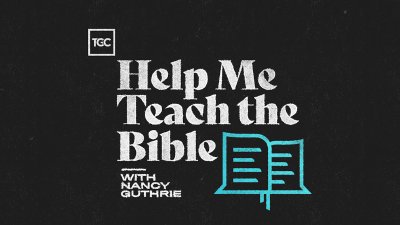


Help Me Teach The Bible
Live at TGCW22: Putting Personality and Passion Into Your Teaching
September 1, 2022 • Nancy Guthrie
In this workshop, recorded live at The Gospel Coalition's 2022 Women’s Conference, Nancy Guthrie works through twelve ways to put personality and passion into your teaching without making it all about you.
Putting Together a Christ-Centered Bible Talk
August 5, 2021 • Nancy Guthrie
You’ve been asked to give a Bible talk. Where do you begin? And how do you make sure you’re understanding and applying the passage rightly? How will you get to the gospel? In this workshop session, recorded live at TGC’s 2021 National Conference, Nancy Guthrie takes listeners through the process of preparing to teach the Bible—including prayer, looking at the context, determining the structure of the passage, composing an aim, creating an outline, getting to the gospel, developing applications, and coming up with an introduction and conclusion. She then applies each of these tasks to putting together a talk on Numbers 6:22–27. Putting Together a Bible Talk worksheet (referred to in this podcast)
It’s Not About You: How Biblical Theology Transforms Bible Study
June 24, 2021 • Nancy Guthrie
Even in churches in which men and women are getting a regular diet of biblical theology and redemptive history from the pulpit, what is being offered in small-group Bible study is often driven by felt needs, has little biblical or theological rigor, or is oriented around self-improvement. But when biblical theology infiltrates Bible study, it puts the emphasis on what Christ has done rather than on what we must do. It helps participants put the various parts of the Bible together so they begin to make sense. And it makes being united to Christ by faith urgent and necessary. In this workshop, recorded live at The Gospel Coalition 2021 National Conference, Nancy Guthrie works through seven ways biblical theology transforms Bible study, as well as ways teachers can develop a deeper grasp of biblical theology.
Nancy Guthrie Answers Listener Questions
September 17, 2020 • Nancy Guthrie
When I began recording interviews for Help Me Teach the Bible in fall 2014 (my very first interview with Derek Thomas is pictured above), I didn’t have a grand plan. At that point I wouldn’t have said I had the goal of recording an episode on each book of the Bible, since that would have seemed like an overwhelming task and too much of a commitment. But I just kept doing interviews, and people kept finding the podcast and listening. I kept being stretched and informed and inspired by getting to have these conversations with people I admired who have helped me in my own teaching. And I have loved it. The podcast now has an episode or two on every book of the Bible, as well as more than 60 topical episodes on various aspects of getting better at teaching the Bible. For this final* episode I asked my husband to turn the tables and interview me about the podcast itself, and I asked listeners to send in questions they wanted me to answer. We talked about how the idea for the podcast came about, why and how I interviewed the people I did, how my own teaching ministry has developed, and what some of my favorite conversations have been. We will continue to re-release old episodes every couple of weeks. Because most podcast apps only offer a limited number of past episodes, we’ll start again from the beginning, posting the earliest episodes from the podcast, which means that the next episode will be an interview with John Piper on teaching the book of Philippians. Listeners who want to communicate with me about the podcast can send me a message using the contact page at http://nancyguthrie.com. Thank you for listening. I hope it has been a help and blessing to you. * I reserve the right to record a new episode here and there when I’m with someone brilliant who’s in a position to talk about something that would serve Help Me Teach the Bible listeners. PODCAST SPONSOR Help Me Teach the Bible is sponsored by Crossway. Crossway is a not-for-profit Christian ministry that publishes the ESV Bible and many gospel-centered books. Learn more at http://crossway.org
Jonathan Gibson on Teaching Obadiah
September 3, 2020 • Nancy Guthrie, Jonathan Gibson
It’s the shortest book in the Old Testament—only 21 verses—and I don’t think I’ve heard it preached or taught. According to my guest, Jonathan Gibson, associate professor of Old Testament at Westminster Theological Seminary, the message of Obadiah is “the realization of the Lord’s sovereignty and the role reversal of Edom and Judah on the day of the Lord.” Essential to understanding and teaching the book is its connection to the narrative of Jacob and Esau; Obadiah applies events from the biographies of Esau and Jacob to Edom and Judah. Rather than teaching Obadiah as a warning against human pride, Gibson suggests that the book should be presented as as the outworking of God’s covenant promise to Abraham to bless those who’ve blessed him and curse those who’ve dishonored him. PODCAST SPONSOR Help Me Teach the Bible is sponsored by Crossway. Crossway is a not-for-profit Christian ministry that publishes the ESV Bible and many gospel-centered books. Learn more at http://crossway.org
Jay Sklar on Teaching Leviticus
August 20, 2020 • Nancy Guthrie, Jay Sklar
Leviticus is the place where the best of intentions to read through the Bible often stall out. But it is a book that Jay Sklar—professor of Old Testament and vice president of academics at Covenant Seminary in St. Louis, Missouri—has studied and written about prolifically. Sklar’s doctoral studies focused on the theology of sin, impurity, sacrifice, and atonement in the Old Testament sacrificial system. He contributed to the study notes of Leviticus for the ESV Study Bible and the introduction and notes for Leviticus for the ESV Gospel Transformation Bible, and he wrote a commentary on Leviticus for the Tyndale Old Testament Commentary Series (InterVarsity Press). In this conversation, Sklar outlines five reasons Leviticus is a challenging book to read and understand, as well as to teach: It is mostly law, which is unappealing to most of us. It is culturally strange. It emphasizes ritual, which we tend to assume is meaningless. Its laws and teachings appear unfair or unjust. It is hard to fit into the larger story of the Bible. But Sklar also offers keen insights into how to make sense of the book and break down some of the barriers to interest. He also talks about how to present Christ through discussing issues that arise in Leviticus such as slavery, homosexuality, ritual impurity, and disability. PODCAST SPONSOR Help Me Teach the Bible is sponsored by Crossway. Crossway is a not-for-profit Christian ministry that publishes the ESV Bible and many gospel-centered books. Learn more at http://crossway.org
Irwyn Ince and Sean Michael Lucas on Applying Scripture to Racism
August 6, 2020 • Nancy Guthrie, Irwyn Ince, Sean Michael Lucas
In the years I’ve spent in the church listening to sermons and teaching, I can think of few times I’ve heard direct applications from the text made to the sin of racism or the sin of apathy toward injustice. Maybe I just didn’t have the ears to hear it. In my own teaching, I may have mentioned racism in a list of sins, or mentioned it as one of the things that will be “no more” in the new heaven and new earth, but I don’t think I’ve ever used an opportunity while teaching a passage to challenge these sins. I want to do better, and I imagine there are a lot of others who do too. That is why I asked two excellent Bible teachers who bring a great deal of experience and credibility to this topic to have a conversation with me about how to rightly and helpfully apply the Bible to the sin of racism. is a pastor at Grace DC Presbyterian Church and director of the Grace DC Institute for Cross-Cultural Mission. He has contributed to the books Heal Us Emmanuel and All Are Welcome: Toward a Multi-Everything Church and is author of the new book The Beautiful Community: Unity, Diversity, and the Church at Its Best. Sean Michael Lucas—senior minister of Independent Presbyterian Church in Memphis—is the author of numerous books on persons and institutions with a history tainted by racism, including Robert Lewis Dabney: A Southern Presbyterian Life, The Legacy of Jonathan Edwards: American Religion and the Evangelical Tradition, Blessed Zion: First Presbyterian Church, Jackson, Mississippi, 1837–2012, and For a Continuing Church: The Roots of the Presbyterian Church in America. PODCAST SPONSOR Help Me Teach the Bible is sponsored by Crossway. Crossway is a not-for-profit Christian ministry that publishes the ESV Bible and many gospel-centered books. Learn more at http://crossway.org
Richard Pratt on Teaching 1 Chronicles
July 23, 2020 • Nancy Guthrie, Richard Pratt
Few teachers are rushing to teach the book of 1 Chronicles. Perhaps that’s because they’ve already taught through 1–2 Samuel and 1–2 Kings, and so much from these earlier books is repeated in 1–2 Chronicles. But according to Richard Pratt—president and co-founder of Third Millennium Ministries and author of the volume on 1–2 Chronicles in the Mentor Commentary series—to not study these books because of repeated material would be similar to not studying Mark or Luke because you’ve already studied Matthew. The Chronicler intentionally diverged from the records of Samuel and Kings to reveal his theological perspectives, and, according to Pratt, this perspective does not take away from his credibility. Rather it serves the purpose of the book, which is to direct his audience to reconsider what they believed about the people of God, about the king and the temple, and about God’s blessings and curses. Rather than simply thinking of 1 Chronicles as historical chronology, we should view it as representing an underlying logical argument, a step-by-step effort at persuasion. In this conversation, Pratt talks about how best to handle the first nine chapters of the book (a lengthy genealogy of the 12 tribes), the importance of the term “all Israel” that’s used throughout the book, and the unique contribution the book makes to what we understand about the role of music in worship. Recommended Resources: Pratt’s section on 1–2 Chronicles in A Biblical-Theological Introduction to the Old Testament: The Gospel Promised 1 & 2 Chronicles: A Mentor Commentary by Richard Pratt ESV Expository Commentary: Ezra–Job, Volume 4 Who Needs The Chronicles? We Do. Knowing the Bible: 1-2 Chronicles, a 12-week Practical Study Series on the Books of 1-2 Chronicles (TGC Course)
Michael McKelvey on Teaching Amos
July 9, 2020 • Michael McKelvey, Nancy Guthrie
There are two statements that I could immediately identify as being from Amos, even though I haven’t spent much time in the book. One is the rhetorical question, “Does disaster come to a city unless the LORD has done it?” (3:6), a question that is really a statement about the sovereignty of God over all things. And then there is Amos’s call: “Let justice roll down like waters, and righteousness like an ever-flowing stream” (5:24). But what is the book’s message? According to Michael McKelvey—associate professor of Old Testament at RTS Jackson, and author of the commentary on the book of Amos in the ESV Expository Commentary Volume 7 —the thesis for the book of Amos is found in Amos 3:2, where God says to Israel: “You only have I known of all the families of the earth; therefore I will punish you for all your iniquities.” Israel’s chosen and privileged position as God’s people makes their rejection of him and his covenant particularly egregious, especially in light of the exodus and conquest of Canaan (2:9–10). “It would be easy to fatigue listeners with the book’s heavy and pervasive message of judgment,” McKelvey says. But he encourages teachers to “let God’s Word convict of sin so that the good news of Christ will transform those who hear.”
Mark Meynell on Becoming a Better Bible Teacher
June 11, 2020 • Nancy Guthrie, Mark Meynell
All of us who dare to stand up and explain the Bible are teachers in progress. We all have ways we can get better. Recently I got to sit down with Mark Meynell, who, in his role as director of Europe and the Caribbean for Langham Preaching, spends most of his time traveling to different parts of the world to help teachers and preachers get better at handling the Bible. According to Meynell, Bible teachers all over the world lament the same thing—a lack of time to do the kind of study they want. But he tells teachers, “You make time for what you think is important.” Meynell says that the marks of really good Bible teaching include faithfulness to the text, relevance to the audience, and clarity in delivery. Our discussion included tips on how to discover the tics that make it hard for our audience to listen, how (and how not) to incorporate passages outside our main text into our talks, and how John Stott modeled what it looks like to be a lifelong learner. Meynell is the author of numerous books, including What Angels Long to Read (Langham Preaching Resources, 2017), When Darkness Seems My Closest Friend (InterVarsity Press, 2018) and his most recent, Colossians and Philemon for You (Good Book, 2018). He blogs at http://markmeynell.net.
Brian Tabb on Teaching Titus
April 30, 2020 • Nancy Guthrie, Brian Tabb
Brian Tabb is academic dean and associate professor of biblical studies at Bethlehem College and Seminary, general editor for Themelios, and author of 1–2 Timothy and Titus: A 12-Week Study in Crossway’s Knowing the Bible series. In our conversation, Tabb answers “what is the book of Titus about?” in several ways, including “Titus is about the gospel at work,” “It’s about being saved for good,” and “Titus is about the organic connection between what is taught and caught.” Over the course of our conversation Tabb helps Bible teachers understand the unique setting of Titus’s ministry—the island of Crete and Cretans who have been saved by grace—as well as the role of good works in the life of a Christian. We also talk about what it looks like to “adorn the gospel” in the way we live it out.
Paul House on Teaching Joel
May 14, 2020 • Nancy Guthrie, Paul House
In these days of COVID-19, plenty of people are asking if the virus is a judgment from God, if he is sending a message to us. I recorded this conversation on the book of Joel with Paul House, professor of Old Testament at Beeson Divinity School, prior to the spread of the virus. But his points have proved timely. Disasters, he says, should cause us to ask, “What have we as a people and a nation been doing? It certainly hasn’t been looking to the Lord. . . . These are meant to get people to repent.” House presents the book as Joel preaching on Deuteronomy 28 and Exodus 34, using vivid imagery to warn of the awful reality of God’s judgments. Joel calls the people of God to turn toward God, assuring them that “even now, if they return to the Lord with all their heart, with fasting, with weeping, and with mourning, he will be gracious and merciful and relent from disaster.” House offers insight on the locusts, the meaning of the the Day of the Lord, and how to present the mercy of Christ for sinners from the pages of Joel.


